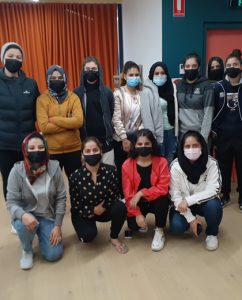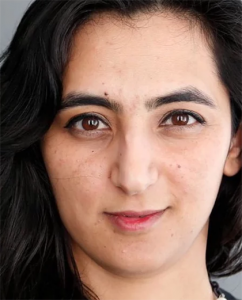‘The game of their lives’ – how the Afghan women’s soccer team lived to play again
The Afghan women’s soccer team should currently be competing in Asian Cup qualifiers taking on other national teams from Central Asia and the Middle East.
Instead, they have fled their country and sought safety across the world as part of the coalition nations’ evacuation of vulnerable people out of Kabul in late August as militant Taliban fighters took control of the city.
The sportswomen feared for their lives and their futures under the Taliban which has re-imposed harsh restrictions on women, including a strict ban on participation in sport.
One group of players has washed up in Melbourne and are seeking to rebuild their lives and sports careers in Australia.
 They are among more than 200 sportswomen – mostly footballers, cricketers and martial arts players – who fled Afghanistan in fear of retribution at the hands of the Taliban.
They are among more than 200 sportswomen – mostly footballers, cricketers and martial arts players – who fled Afghanistan in fear of retribution at the hands of the Taliban.
One player ‘Zahra’ (not her real name) spoke to iMPACT this week about the trauma of having to flee her homeland; and of her fears for the women of Afghanistan and her own family members.
Zahra, who iMPACT has chosen not to identify over safety concerns, has played for youth and senior national football teams for several years.
She tells of the team’s dramatic exit from Kabul amid bombings, gunfire and human stampedes; and also of the heartbreak of leaving family members and teammates behind to face an uncertain future.
“The week the Taliban took over in Afghanistan we were very worried. We were scared the Taliban would target us because we were women athletes,” Zahra said.
“We heard news they were taking away women athletes, arresting some players and that some other players had been kidnapped or killed in remote provinces,” she said.
Zahra said she and her teammates were supported through their ordeal by Khalida Popal, a former Afghan women’s team captain and founder of the Denmark-based women’s rights NGO ‘Girl Power’.
“Khalida sent us a message to get together a backpack with our basic necessities and a mobile phone and power bank. She told us not to take any documents which the Taliban could use to identify us,” she said.
“We spent that night the Taliban came awake, talking and watching the bad news unfold on social media. All night we were hoping someone would come and help us.
“When we decided we had to try to get to the airport, our families were supportive. They were happy for us to go telling us that we were in danger.
“But we were all worried, in turn, about our families. There were still documents that could identify us and put in danger our families who would be left behind in Afghanistan,” Zahra said.
She said that the team had become well known in Afghanistan through social media and publicity around the matches they had played in five major tournaments staged since 2019 – the last being against Tajikistan at the CAFA Tournament in June.
Zahra said that finally, they got a message from Khalida to take their backpacks and go to the airport. Khalida had organised visas for the group with coalition nations.
“We set off for the airport, most of us with family members who we were hoping would be able to come with us. It was very scary, there were guns firing in the air and lots of people outside the airport,” she said.
“We went to different gates and we had to go through Taliban checkpoints. It was really dangerous.”
Zahra and teammates were separated in the crowd as they tried desperately to get into Kabul’s international airport – at the time, the last bastion of coalition forces in Afghanistan.
“It was very difficult for us. We went to each gate to try to get in but at each gate none of the soldiers knew who we were. We had been outside the airport for 24 hours and no one had come to help us. We started to lose hope,” she said.
Finally after 48 hours looking for a way in the team got a crucial and ultimately life-saving message from Khalida to ‘go to the south gate’.
“I volunteered to go first and find a way in and I promised I would get everyone else in,” Zahra said.
“Khalida had said ‘the Australian military will help you’ but just as I approached the gate my phone was almost dead and I could not tell everyone else on our WhatsApp group what was happening,” Zahra said.
 Just then the suicide bombs went off creating more confusion for the women.
Just then the suicide bombs went off creating more confusion for the women.
“I got through the gate after three hours and three attempts but just as I did, my phone died so I had no contact outside,” Zahra said.
“Luckily some of our girls also got through and I was able to use their phones to contact everyone else and guide them to the gate,” she said.
But many of the women had to leave behind family members who were not allowed through Taliban checkpoints.
“Luckily our girls were able to go the right way to the gate but it was very difficult and they were lucky to get in. The Taliban were beating people,” Zahra said.
“And the Taliban would not let through people without visas so many of our family members had to stay behind. Our families put us first, they said ‘you go now, we’ll follow you later’.
“We were all separated from family members at the checkpoints and most of us didn’t get to say goodbye with all the chaos. It was heartbreaking for us,” Zahra said.
At the last checkpoint she was kicked and punched by a Taliban fighter demanding to know who she was.
“He was shouting at me in Pashtu but I only speak Dari so he got more annoyed. I don’t know how, but I made it through to the airport gate,” Zahra said.
She said three siblings had managed to get out with her but her parents and other relatives remain in Afghanistan.
Zahra said that once inside the airport perimeter, she helped Australian soldiers identify teammates still outside and help them get across ditches and razor wire to safety.
They spent three nights in a makeshift camp inside the airport in freezing conditions before eventually being flown out to Dubai on a military aircraft.
After nine days at the Australian military’s Camp Arcadia in Dubai the team was flown to Australia and into hotel quarantine.
Most have chosen to stay together and settle in Melbourne. They are looking forward to their futures in a new country but still harbouring fears for family and fellow sportswomen still in Afghanistan.
In a recent sinister statement the Taliban said it was “not necessary” for women to be involved in sport and that “Islam and the Islamic Emirate (Afghanistan) do not allow women to play … the kind of sports where they get exposed”.
In response, Khalida Popel hailed the evacuation of sportswomen from Afghanistan as “an important victory”.
“The last few days have been extremely stressful but today we have achieved an important victory,” she said.
“The women footballers have been brave and strong in a moment of crisis and we hope they will have a better life outside Afghanistan.
“We are relieved that this group of footballers and athletes have been able to leave Afghanistan today. Our hearts go out to all the others who remain stranded in the country against their will,” Khalida said.
Zahra said that she was heartbroken that women’s sport in her homeland would now come to an end.
“We should be playing Asian Cup qualifiers right now but instead all we have worked for and hoped and dreamed about has been swept away,” she said.
“Most of us were studying at university at home but now women in Afghanistan will not be able to do that.
“The Taliban said they would respect women. But there is no respect for women, they have been removed from cabinet and Afghanistan is going backwards into the past. It’s shameful,” Zahra said.
But football remains a symbol of hope for the future for the women.
“Some of our girls have been traumatised. They have seen so many bad things. But I think football will help us get over these bad times,” she said.
“I certainly want to play again to build my future and make connections. We are not going to dwell on the past. We are going to do our best to be role models and to be strong for ourselves and for women still in Afghanistan.
“We heard that there’s a professional women’s football league in Australia. That is really exciting,” Zahra said.












